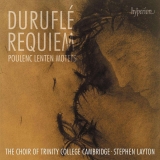Mit Aufführungen und einer neuen Aufnahme von Maurice Duruflés Requiem hat sich Stephen Layton nach 17 Jahren als Dirigent des Trinity College Cambridge verabschiedet. Es wurde ein mehr als bemerkenswerter Abschied, denn diese Duruflé-Interpretation ist schwerlich zu toppen.
Nicht zu Unrecht werden Faurés Requiem und Duruflés Vertonung der Totenmesse als Schwesternwerke beschrieben, stellen sie doch die Hoffnung auf ewigen Seelenfrieden in den Mittelpunkt, weniger das donnernde Strafgericht Gottes.
Stephen Layton weiß diese Aussicht auf ewige Ruhe und Frieden – Requiem aeternam – auf eine geradezu sinnliche Art und Weise musikalisch in den Raum zu stellen. Zagen und Verzweiflung haben hier keinen Platz. Die enorme spirituelle Tiefe des Notentextes erreichen Dirigent und Chor durch klare, zarte Gesangslinien, durch die natürliche Symbiose von Gregorianik und raffinierten Harmonien, den homogenen Chorgesang, der sanft im Raum schwebt. Schreibt die Partitur einen gesättigteren Klang vor – etwa die wunderbar nach oben strebende Steigerung im Kyrie – wirken diese Passagen nie äußerlich und plakativ, sondern fügen sich nahtlos in diese von ungeteilter Zuversicht geprägten Lektüre ein.
Nicht minder ausdrucksstark gelingen ebenso die nahezu zeitgleich entstandenen vier Poulenc-Motetten. Auch hier steht die geistliche Durchdringung von Text und Musik stets im Vordergrund, die kontrastreich, expressiv und inspirierend gestaltet werden.
With performances and a new recording of Maurice Duruflé’s Requiem, Stephen Layton bid farewell after 17 years as conductor of Trinity College Cambridge. It is a more than remarkable farewell, for this Duruflé interpretation is hard to beat.
It is not without reason that Fauré’s Requiem and Duruflé’s setting of the Mass for the Dead have been described as sister works, for they focus on the hope of eternal peace of mind rather than the thunderous judgment of God.
Stephen Layton knows how to musically present this prospect of eternal rest and peace – Requiem aeternam – in an almost sensual way. Fear and despair have no place here. Conductor and choir achieve the enormous spiritual depth of the musical text through clear, delicate vocal lines, through the natural symbiosis of Gregorian chant and refined harmonies, through the homogeneous choral singing that gently floats in space. Where the score calls for a more saturated sound – as in the wonderfully soaring climax of the Kyrie – these passages never seem outlandish and bold, but fit seamlessly into this reading, which is characterized by undivided confidence.
The four Poulenc motets, composed almost simultaneously, are no less expressive. Here, too, the spiritual penetration of text and music is always in the foreground, rich in contrast, expressive and inspiring.
























